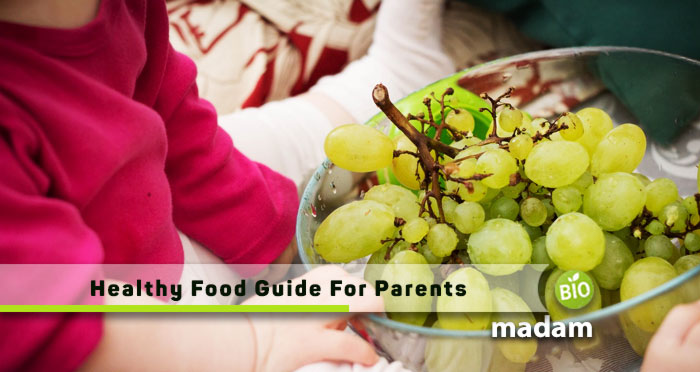Recently updated on January 31st, 2024 at 07:39 am
As a parent, one of the most important jobs we have is to ensure that our children get the right nutrition and healthy food to fuel up their little bodies for development. Healthy food is integral for the proper growth and health of babies and toddlers.
We understand how overwhelming it can be to figure out which foods are best – proteins, fruits, vegetables…it’s hard enough finding time in between diaper changes or lots of playtimes! With this guide, your goal as a parent can become easier; learn how you can supply your little ones with nutritious meals fit for every stage of development.
This post will cover essential tips around selecting appropriate nutrients, creating meal plans, cooking methods, and much more! Let’s take this journey together, so you can raise healthier kids!
The Importance of Healthy Food for Babies
We all want the best for our babies. One of the most important things we can provide for them is a healthy and balanced diet. During the first year of life, babies rely solely on breast milk or formula.
However, as they begin to grow and develop, it’s necessary to incorporate nutritious foods into their diet. Providing your baby with a variety of fruits, vegetables, whole grains, and lean proteins helps ensure they receive the necessary nutrients for optimal growth and development.

Introducing healthy foods early on can also help establish healthy eating habits that can last a lifetime. So, as you begin your journey into parenthood, remember the significant role that healthy food plays in your baby’s overall health and well-being.
For example, baby-led weaning is a great way to introduce healthy foods early on. This method allows your baby to feed themselves with puréed and finger-friendly foods. You can find out more about proper baby-led weaning by doing a bit of research online. This helps them learn about different textures, tastes, and colors of food while developing their fine motor skills.
Benefits of Giving Your Baby a Variety of Foods
When it comes to feeding our little ones, we often focus on giving them a limited selection of foods that we know they like. However, introducing a variety of foods to your baby’s diet can offer significant benefits.
Firstly, it ensures that they are getting all of the vital nutrients needed for healthy growth and development. Secondly, it helps to expand their palate and develop their taste buds. This can lead to more adventurous eaters as they continue to grow.
Finally, introducing a variety of textures and tastes can also help to prevent fussy eating habits and obesity later in life. So, don’t be afraid to mix it up and give your baby a diverse range of foods to discover and enjoy.
Nutrients Needed for Healthy Development in Babies
As parents, we all want our babies to develop healthily. One of the most important ways we can facilitate this is by ensuring that they receive all the necessary nutrients. Babies need a balanced diet that provides energy, protein, vitamins, and minerals.
Protein is essential for the growth and development of muscles, tissues, and organs. Meanwhile, vitamins like A, C, and D help with good vision, a healthy immune system, and strong bones respectively.
Minerals such as iron, calcium, and zinc are also crucial for the proper development of our little ones. As they grow, it’s important to keep in mind that their needs will change, so we must stay informed and adjust their diets accordingly.
Which Foods to Avoid Giving to Your Baby
One way to ensure our baby’s well-being is to be mindful of what they eat. While it’s tempting to introduce them to a wide range of foods, certain items should be avoided.
For example, honey may be off-limits for babies under 12 months old due to the risk of botulism. Similarly, cow’s milk is not ideal as their main drink before they turn one. Foods that are high in salt, sugar, and artificial ingredients should also be avoided as they do not provide much nutritional benefit.
Overall, it’s important to consult with your pediatrician to get a better understanding of what foods to steer clear of to keep your baby healthy and happy. Plus, they can provide further insight into which foods are best for your baby’s unique needs.
Keep in mind that your baby’s diet should gradually change and evolve as they grow. It’s essential to provide them with the nutrition that their body needs for healthy development, so be sure to stay informed and adjust accordingly.
Age and Developmental Stages
As a parent, you want to make sure that your child is getting all the nutrients they need to grow up happy and healthy. But when it comes to introducing different types of food, it can be challenging to know when and how to start.
The recommended age for introducing solid foods is around six months, but it’s important to consider your baby’s readiness cues and developmental stage. For instance, if your little one is showing an interest in reaching for and grabbing food, they may be ready to start experimenting with purées and finger foods.
As they continue to grow and develop, you can gradually introduce a wider variety of healthy foods to their diet. By being mindful of your child’s individual needs and developmental stage, you can help them develop healthy eating habits that will last a lifetime.

By giving your baby the right kinds of foods at the right stages in their development, you can ensure they will have a healthy foundation upon which to build. A big part of baby nutrition is making sure that their meals are enjoyable and nutritious.
Although there is still much to learn about the exact foods and nutrients needed for optimal infant growth, by introducing them to a variety of foods, you can give them a good start on their way to healthy development.
Through a balanced diet including proteins, grains, dairy products, fruits and vegetables, and occasional treats, parents can foster healthy eating habits in their babies from an early age. With this guide as a reference, even the busiest parents will be able to provide tasty yet nutritional meals for their babies!

Hi, they call me Jenna, and I am also known for achieving a gold medal during my Ph.D. in science life. I always had a dream to educate people through my utmost writing hobby. So, I chose this blogging path, and Biomadam gave me this opportunity to present for them. I now stand to entertain you. Continue reading my articles & discuss if you’ve any confusion through the comment section below.

